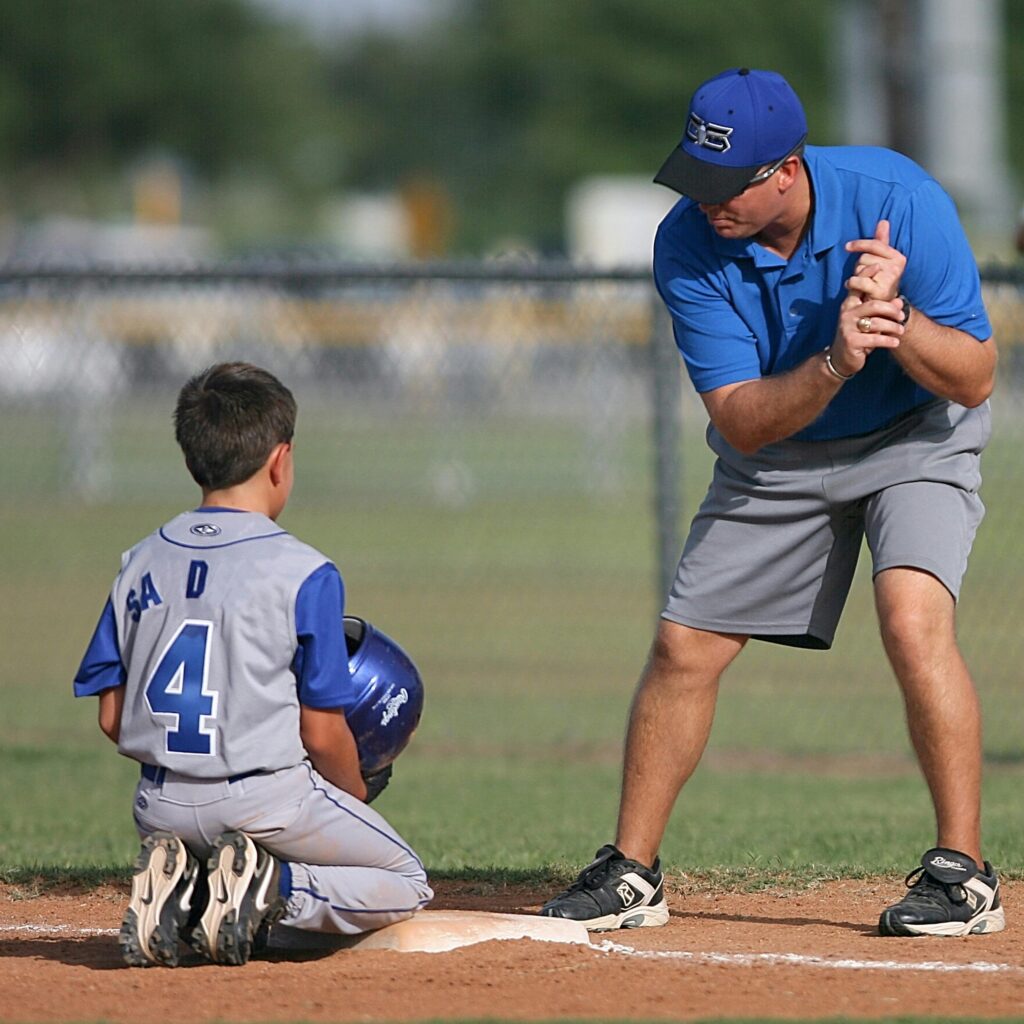Challenges of Coaching Your Own Kid
- 11/07/2024
- College Recruiting
- 6 mins read

Table of Contents
Toggle"The Hidden Challenges of Coaching Your Own Kid: Why Wearing Both Hats Is Harder Than You Think"
Coaching your own kid often sounds like the ultimate dream: you’re there for every milestone, every success, every setback, offering support, guidance, and wisdom. But parents who’ve taken on this dual role quickly realize it’s one of the toughest balancing acts in sports. As a parent, your instincts are to protect, encourage, and support; as a coach, your role is to be fair, objective, and sometimes even tough. Managing these roles simultaneously can create unexpected friction, both on and off the field.
Let’s explore the unique challenges parent-coaches face, why it’s hard to keep the parent and coach hats separate, and some practical strategies for maintaining a strong bond with your child while helping them grow in the game.
Coaching Your Own Kid
1. Balancing the Roles of Parent and Coach
The parent role is naturally nurturing, supportive, and protective. As a coach, you also need to balance support with constructive criticism, even when it’s difficult to deliver. For most players, feedback from a coach feels like part of the game; but for your child, that same critique can feel personal, leading to confusion or hurt feelings.
Example: Imagine your child had a rough game, and as a coach, you want to discuss areas for improvement. For most kids, this feedback might be taken in stride. But for your own child, there’s a risk of feeling like your feedback is more than just advice—they may feel they’re disappointing you as a parent too.
Tip: Try setting aside specific times to be “the coach” and others to be just “the parent.” Before practice, make it clear that you’re in “coach mode.” After practice or games, have a quick debrief, then leave the game on the field. This separation can give your child the space to enjoy a supportive parent-child relationship without feeling like they’re always in “game mode” around you.
2. Avoiding Unintentional Pressure
Even the most well-meaning parents can fall into the trap of setting high expectations for their child-athlete. In the coach’s role, there’s a desire to see your player succeed. But when that player is your child, the emotional stakes feel higher. It’s easy to expect more from them because you’ve invested so much in their progress, and sometimes this inadvertently puts pressure on them to excel at a level they may not be ready for.
Example: You may encourage your child to try out for the most competitive team or push them to stay for extra practice sessions, hoping to help them improve. However, if your child doesn’t share the same competitive drive, they may feel as if they’re letting you down, leading to stress or even burnout.
Tip: Check in with your child regularly about their goals. Ask them what they enjoy most about playing, what they hope to achieve, and where they’d like to improve. This helps align your coaching to their personal goals and reminds them that you’re there to support their dreams, not just your own ambitions for them.
Coaching Your Own Kid
3. Perceptions from Other Parents and Players
Another challenge is navigating the perception of fairness from other parents and players. Even with the best intentions, others may view your child as having an advantage simply because they’re “the coach’s kid.” On the flip side, you may try to overcompensate by being extra hard on your child to avoid any appearance of favoritism, which can backfire by making your child feel isolated or unfairly treated.
Example: Suppose you assign your child to the bench during a big game, thinking it’s best to avoid the appearance of favoritism.”AKA – Nepotism” Meanwhile, your child is disappointed, feeling they’ve earned the chance to play and now feel overlooked because of their relationship to you.
Tip: Be as transparent as possible with both your team and the parents. Clearly explain your coaching philosophy, the criteria you use for playing time, and the importance of merit-based decisions. This will set expectations upfront and can reduce potential misunderstandings. Be conscious of treating your child as fairly as the other players—not overly critical, and not overly lenient.
4. Keeping Home and Field Life Separate
One of the biggest challenges of coaching your own kid, is keeping the coach-parent dynamic from seeping into family life. For many kids, sports are an activity they can leave on the field. But when their parent is also their coach, the game can follow them home, making it feel inescapable. This dynamic can lead to tension, stress, and even resentment if children feel they don’t have a “safe space” away from performance and expectations.
Example: Suppose you bring up a mistake your child made during a game while having dinner at home. What might have been a quick coaching comment at practice becomes a family discussion that they can’t escape, creating feelings of frustration or resentment.
Tip: Create clear boundaries. After games and practices, focus on family time and other interests your child enjoys. Give them space to bring up sports if they want to, but don’t make it the primary topic of conversation. By establishing “sports-free” zones at home, you allow your child to enjoy both family life and the sport without feeling they’re always under a microscope.
Coaching Your Own Kid
5. Emotional Investment Can Cloud Judgment
The deep emotional investment you have in your child’s success can make it difficult to maintain objective judgment. It’s natural to want to see your child shine, but sometimes this can lead to giving them more guidance, feedback, or attention than they’re prepared to handle, which can affect their enjoyment of the game and even their performance.
Example: Your child is struggling with a certain skill, and you’re tempted to offer extra drills and practice sessions at home. You feel you’re helping, but your child may start feeling pressure, or even resentment, if they sense you’re prioritizing improvement over enjoyment.
Tip: Stay mindful of your child’s emotional responses. Instead of immediately stepping in with extra drills or instructions, ask if they want additional support or help in that area. Allow them to take ownership of their improvement and self-motivation rather than relying solely on you to guide them.
Benefits of Getting Coaching Support from Outside Sources
It can be helpful to involve other coaches or mentors to offer additional support, guidance, and constructive feedback. Allowing your child to receive guidance from someone else can make the experience of playing more balanced and reduce any feelings of overwhelm.
Example: Many parent-coaches work with assistant coaches who can help train or offer feedback, allowing the parent-coach to step back and show their child that they have multiple sources of support and mentorship. Your child may also feel less pressure in situations where a non-family member is guiding them, creating a healthier environment for skill development.
Coaching Your Own Kid
Final Thoughts: Striking the Balance for a Rewarding Experience
Coaching your own kid can be a highly rewarding experience, but it’s not without its challenges. By approaching the role with awareness and taking steps to balance your dual roles as parent and coach, you can foster both their athletic growth and your relationship.
Setting clear boundaries, listening to their needs, and remaining transparent with your team and other parents can help you manage the demands and make the experience positive for both of you. Ultimately, coaching your own kid can strengthen your bond and build meaningful memories—just remember to keep family as your top priority.
By understanding these challenges and committing to clear communication, respect, and boundaries, you can navigate the delicate line between parent and coach. And remember, while their athletic journey is important, the most valuable win is the strong relationship you’ll have with them beyond the field.
If you would like to learn about our high school recruiting services, please click on the link below.




